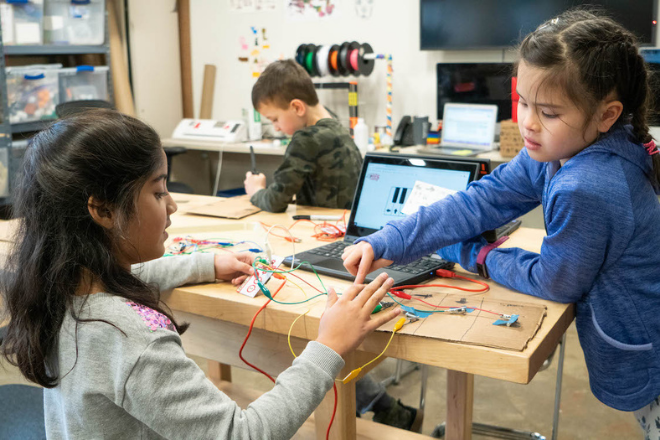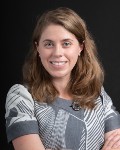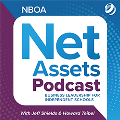Now in its second year, the Jeffrey Shields Award for Innovation Excellence in School Business Operations recognizes NBOA member schools that have demonstrated innovation in school business operations through approaches, programs and/or practices that may serve as a model in our independent school community.
The following article is an excerpt from the article, "Room To Grow," which profiles the 2022 NBOA Innovation Excellence Award eecipients and reveals the inspiration and perspiration behind the award-winning initiatives, as well as outcomes that have bettered their schools and communities.
“Education is not practice for real life; it is real life.” That’s the message Bennett Day School strives to deliver with Bennett Labs, a project-based learning lab that has helped the school generate non-tuition revenue and enhance its value proposition.
The vision for Bennett Labs was formed in 2016, when the school’s CEO and co-founder Cameron Smith began discussions with educational consultant Frances Judd about an idea that would enable the school to create projects that extend outside the campus and into the broader world. The discussions revealed an opportunity to redefine what a traditional lab school might look like.
“We want our students growing up with an entrepreneurial spirit. Children shouldn’t have to wait until adulthood before they feel they are involved in projects that have a life in the real world.”
“We were interested in exploring the questions like, What happens when you include three-year-old’s as valued co-designers in the learning experience?” said Judd, who is now a Bennett Labs fellow and early childhood teacher at the school. “We want our students growing up with an entrepreneurial spirit. Children shouldn’t have to wait until adulthood before they feel they are involved in projects that have a life in the real world.”
Take, for instance, Bennett Labs’ Osmo Kaleidoscope, a kinetic and collaborative mobile app that empowers users to create kaleidoscope images with everyday objects, toys, art materials or items from nature. For this project, Bennett Labs partnered with Tangible Play, Inc., now owned by Byju, one of the largest ed tech companies in the world. Bennett Labs was already using Tangible Play technology in their classrooms, and Judd knew people who worked there through a previous partnership with Northwestern University. The partnership led to school-wide experimentation and product development.

“There’s no product that we’ve made where we start out with one particular student or grade level in mind. Rather, we look for projects that have a school-wide synergy,” said Judd. In practice, that involved teachers and students co-designing a new type of symmetry app with tangible-user interface, while fourth graders learned to use Unity special-effects programming to enhance the app’s appeal. Now that Bennett includes upper school students, school leaders look forward to new design projects that include high school participation.
The Osmo Kaleidscope wasn’t the first product to be released from Bennett Labs. The first was a set of paper-based storytelling cards — it yielded the most visible results in the form of enrollment. Following the app’s release, school leaders presented Bennett Labs’ products at the Chicago Toy and Game Fair, where they met Chicago families interested in an innovative school such as Bennett. “We were not only joined by excited current families but met by families who sent in their applications that weekend,” said Smith. It was a lightbulb moment: when families could see what the school was all about — project-based, hands-on learning — it resonates and helps drive applications.
Profits from Apple and Amazon store sales go directly back into the school’s operating budget, which has helped the school build a new wing and keep tuition increases under 4% each year. Most importantly, revenue from the Labs has helped fund financial aid and scholarships at Bennett Day School, where the number of families on financial aid is more than double the national average.
A key factor in Bennett Labs’ success has been the school’s partnerships with various design, learning and technology partners, such as Northwestern University’s TIDAL Lab (Tangible Interaction Design and Learning), which first partnered with the school in 2016 to pilot learning methods and analyze how different generations work together. Today, the relationship builds on that “firm foundation.”
“Should Northwestern students have something they want to know as it relates to their research — if they’d like to see how real-world teachers respond to a new product or idea — they have access to our faculty. Likewise, we gain access to their expertise in software development and learning sciences,” said Smith. For example, TIDAL Lab and Bennett Labs are currently collaborating on teacher productivity software designed to simplify documentation of PBL (project-based learning) and writing narratives for independent schools by offering new forms of artificial intelligence and natural language processing.
Smith and Judd recommend that other schools looking to form collaborative partnerships with organizations and researchers start by nailing down a highly specific non-disclosure agreement on intellectual property ownership. “How will you bring the product to life commercially? How will you share the resources? Whose idea was it in the first place? These are just a few of the questions you need to consider,” said Smith. At the end of the partnership, Tangible Play made Bennett Day School an offer to acquire the intellectual property and the code behind Osmo Kaleidoscope.
“Independent schools are asking themselves, How can we generate revenue outside the traditional capital campaign? How can we bring learning outcomes outside the classroom?”
The success of Bennett Labs has also opened up the door for individual consulting partnerships with other independent schools across the country. “Independent schools are asking themselves, How can we generate revenue outside the traditional capital campaign? How can we bring learning outcomes outside the classroom?” said Smith.
For Judd, the answer is simple: “Schools tend to generate inventive ideas. Take yourself and your ideas seriously. If you have a faculty member or administrator that comes to you with a gap in your school’s processes or thinks of a product that they can't find, ask if you can make it [or find a solution] yourself. That kind of thinking opens up pathways of success for the school.”



.png?sfvrsn=a0b06f90_1)


